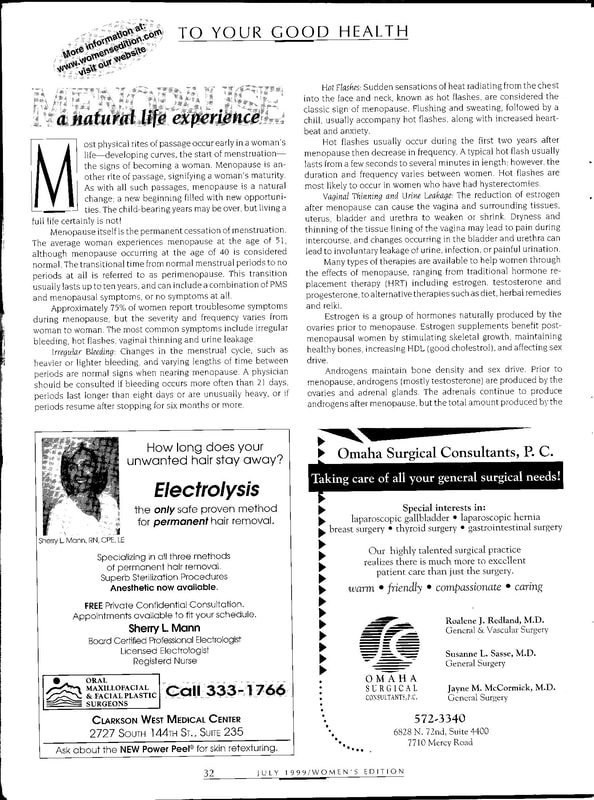To Your Good Health - July 1999MENOPAUSE: A NATURAL LIFE EXPERIENCEBy Diana L. Criser |
| ||

ost physical rites of passage occur early in a woman's life - developing curves, the start of menstruation - the signs of becoming a woman. Menopause is another rite of passage, signifying a woman's maturity. As with all such passages, menopause is a natural change; a new beginning filled with new opportunities. The child-bearing years may be over, but living a full life certainly is not!
Menopause itself is the permanent cessation of menstruation. The average woman experiences menopause at the age of 51, although menopause occurring at the age of 40 is considered normal. The transitional time from normal menstrual periods to no periods at all is referred to as perimenopause. This transition usually lasts up to ten years, and can include a combination of PMS and menopausal symptoms, or no symptoms at all.
Approximately 75% of women report troublesome symptoms during menopause, but the severity and frequency varies from woman to woman. The most common symptoms include irregular bleeding, hot flashes, vaginal thinning and urine leakage.
Irregular Bleeding: Changes in the menstrual cycle, such as heavier or lighter bleeding, and varying lengths of time between periods are normal signs when nearing menopause. A physician should be consulted if bleeding occurs more often than 21 days, periods last longer than eight days or are unusually heavy, or if periods resume after stopping for six months or more.
Hot Flashes: Sudden sensations of heat radiating from the chest into the face and neck, known as hot flashes, are considered the classic sign of menopause. Flushing and sweating, followed by a chill, usually accompany hot flashes, along with increased heartbeat and anxiety.
Hot flashes usually occur during the first two years after menopause then decrease in frequency. A typical hot flash lasts from a few seconds to several minutes in length; however, the duration and frequency varies between women. Hot flashes are most likely to occur in women who have had hysterectomies.
Vaginal Thinning and Urine Leakage: The reduction of estrogen after menopause can cause the vagina and surrounding tissues, uterus, bladder and urethra to weaken or shrink. Dryness and thinning of the tissue lining of the vagina may lead to pain during intercourse, and changes occurring in the bladder and urethra can lead to involuntary leakage of urine, infection, or painful urination.
Many types of therapies are available to help women through the effects of menopause, ranging from traditional hormone replacement therapy (HRT) including estrogen, testosterone and progesterone, to alternative therapies such as diet, herbal remedies and reiki.
Estrogen is a group of hormones naturally produced by the ovaries prior to menopause. Estrogen supplements benefit post-menopausal women by stimulating skeletal growth, maintaining healthy bones, increasing HDL (good cholesterol), and affecting sex drive.
Androgens maintain bone density and sex drive. Prior to menopause, androgens (mostly testosterone) are produced by the ovaries and adrenal glands. The adrenals continue to produce androgens after menopause, but the total amount produced by the body is greatly reduced. Replacement therapy combines androgens with estrogen.
After menopause, bones tend to lose significant amounts of calcium, which leads to osteoporosis in approximately 25% of women. Estrogen alone has been found to stop calcium loss, but combining androgens with estrogen can promote new bone formation and has also been reported to increase libido, energy levels and sense of well-being, as well as skin thickness and suppleness.
Progesterone is another hormone naturally produced by the ovaries prior to menopause. Progesterone supplements are usually prescribed in synthetic form, due to the rapid breakdown of the natural form by the liver, and are combined with estrogen. Post-menopausal women who have not had hysterectomies have an increased risk of uterine cancer from estrogen therapy alone; progesterone combined with estrogen reduces the chance of uterine cancer below the baseline level.
A change in diet can be used to relieve some of the common discomforts associated with menopause. for example, a University of Illinois study has shown six months of a high soy diet causes a significant increase in bone density, and a separate study at Bowman Gray Medical School shows 20 grams of soy consumed per day can decrease hot flashes. Diets including 30 to 40 grams of soy daily have also been known to lower cholesterol levels by 10 to 20 percent. Nutritional supplements, including calcium and vitamin D, can also be beneficial to post-menopausal women.
Herbal remedies may be a viable option for certain women who are not interested in or may be harmed by traditional hormone replacement therapy. For example, ginseng may prevent thinning of the vagina and reduce fatigue, while dong quai and black cohosh are said to decrease the severity of hot flashes. chaste berry is said to regulate perimenopausal bleeding and other menopausal symptoms, and goldenseal may reduce post-menopausal irritation and inflammation.
An interesting web site which seems to offer helpful information regarding menopause and its treatments can be found at http://www.menopause-online.com (Author's 2020 note: This site has since changed ownership/content). Seeking information on a topic such as menopause can ease fears and open a window to realization. Menopause is a necessary rite of passage carrying a mixture of emotions, as do all of life's transitions. It is a natural part of a woman's life and should be viewed as a wonderful new beginning.
Menopause itself is the permanent cessation of menstruation. The average woman experiences menopause at the age of 51, although menopause occurring at the age of 40 is considered normal. The transitional time from normal menstrual periods to no periods at all is referred to as perimenopause. This transition usually lasts up to ten years, and can include a combination of PMS and menopausal symptoms, or no symptoms at all.
Approximately 75% of women report troublesome symptoms during menopause, but the severity and frequency varies from woman to woman. The most common symptoms include irregular bleeding, hot flashes, vaginal thinning and urine leakage.
Irregular Bleeding: Changes in the menstrual cycle, such as heavier or lighter bleeding, and varying lengths of time between periods are normal signs when nearing menopause. A physician should be consulted if bleeding occurs more often than 21 days, periods last longer than eight days or are unusually heavy, or if periods resume after stopping for six months or more.
Hot Flashes: Sudden sensations of heat radiating from the chest into the face and neck, known as hot flashes, are considered the classic sign of menopause. Flushing and sweating, followed by a chill, usually accompany hot flashes, along with increased heartbeat and anxiety.
Hot flashes usually occur during the first two years after menopause then decrease in frequency. A typical hot flash lasts from a few seconds to several minutes in length; however, the duration and frequency varies between women. Hot flashes are most likely to occur in women who have had hysterectomies.
Vaginal Thinning and Urine Leakage: The reduction of estrogen after menopause can cause the vagina and surrounding tissues, uterus, bladder and urethra to weaken or shrink. Dryness and thinning of the tissue lining of the vagina may lead to pain during intercourse, and changes occurring in the bladder and urethra can lead to involuntary leakage of urine, infection, or painful urination.
Many types of therapies are available to help women through the effects of menopause, ranging from traditional hormone replacement therapy (HRT) including estrogen, testosterone and progesterone, to alternative therapies such as diet, herbal remedies and reiki.
Estrogen is a group of hormones naturally produced by the ovaries prior to menopause. Estrogen supplements benefit post-menopausal women by stimulating skeletal growth, maintaining healthy bones, increasing HDL (good cholesterol), and affecting sex drive.
Androgens maintain bone density and sex drive. Prior to menopause, androgens (mostly testosterone) are produced by the ovaries and adrenal glands. The adrenals continue to produce androgens after menopause, but the total amount produced by the body is greatly reduced. Replacement therapy combines androgens with estrogen.
After menopause, bones tend to lose significant amounts of calcium, which leads to osteoporosis in approximately 25% of women. Estrogen alone has been found to stop calcium loss, but combining androgens with estrogen can promote new bone formation and has also been reported to increase libido, energy levels and sense of well-being, as well as skin thickness and suppleness.
Progesterone is another hormone naturally produced by the ovaries prior to menopause. Progesterone supplements are usually prescribed in synthetic form, due to the rapid breakdown of the natural form by the liver, and are combined with estrogen. Post-menopausal women who have not had hysterectomies have an increased risk of uterine cancer from estrogen therapy alone; progesterone combined with estrogen reduces the chance of uterine cancer below the baseline level.
A change in diet can be used to relieve some of the common discomforts associated with menopause. for example, a University of Illinois study has shown six months of a high soy diet causes a significant increase in bone density, and a separate study at Bowman Gray Medical School shows 20 grams of soy consumed per day can decrease hot flashes. Diets including 30 to 40 grams of soy daily have also been known to lower cholesterol levels by 10 to 20 percent. Nutritional supplements, including calcium and vitamin D, can also be beneficial to post-menopausal women.
Herbal remedies may be a viable option for certain women who are not interested in or may be harmed by traditional hormone replacement therapy. For example, ginseng may prevent thinning of the vagina and reduce fatigue, while dong quai and black cohosh are said to decrease the severity of hot flashes. chaste berry is said to regulate perimenopausal bleeding and other menopausal symptoms, and goldenseal may reduce post-menopausal irritation and inflammation.
An interesting web site which seems to offer helpful information regarding menopause and its treatments can be found at http://www.menopause-online.com (Author's 2020 note: This site has since changed ownership/content). Seeking information on a topic such as menopause can ease fears and open a window to realization. Menopause is a necessary rite of passage carrying a mixture of emotions, as do all of life's transitions. It is a natural part of a woman's life and should be viewed as a wonderful new beginning.


